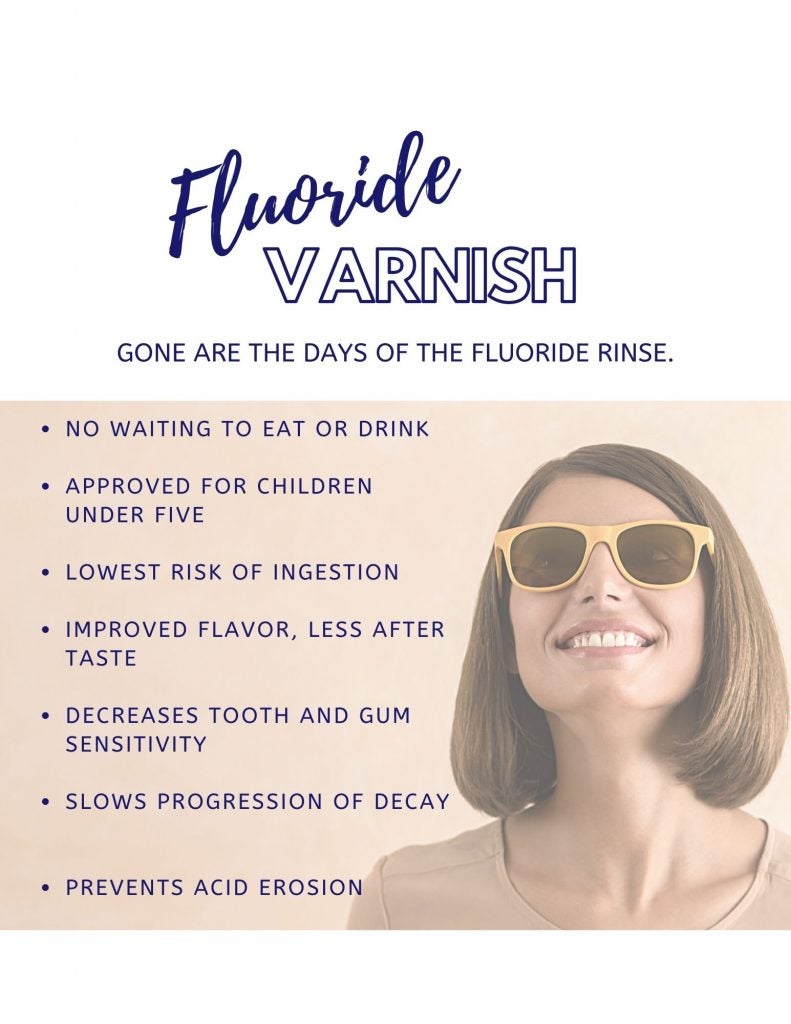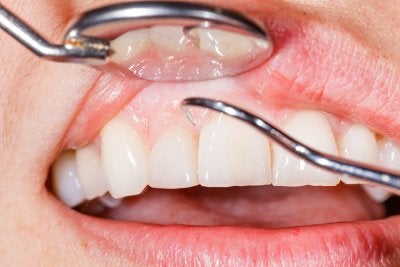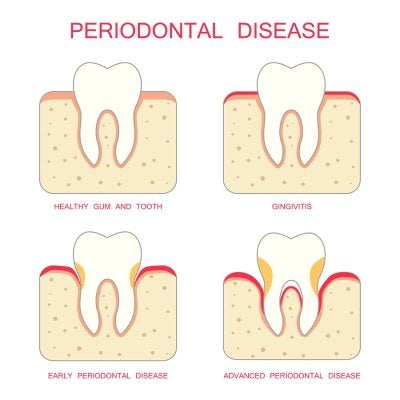-
Elevating Dental Care: Introducing Fluoride Varnish to Our Standard of Care for Adult Patients
Introduction: At Your Smile Bel Air Family Dentistry, we are committed to providing our adult patients with outstanding dental care that goes beyond expectations. We are excited to announce the formal inclusion of fluoride varnish* as a core component of our standard of care. In this blog post, we will introduce fluoride varnish, highlight its advantages over other fluoride treatments, and emphasize its low risk of ingestion and convenience for our valued adult patients.
Understanding Fluoride Varnish: Fluoride varnish is a highly effective preventive treatment that offers targeted protection against tooth decay and enamel erosion. It is a concentrated gel-like substance that contains a higher concentration of fluoride compared to other fluoride treatments. Here’s why we have chosen to incorporate fluoride varnish into our standard of care for adults:
1. Enhanced Protection: The application of fluoride varnish forms a durable coating on the teeth, acting as a physical barrier against acid attacks and enamel demineralization. This protective layer significantly reduces the risk of tooth decay and helps maintain strong, healthy teeth.
2. Low Risk of Ingestion: We understand the concerns surrounding fluoride ingestion, especially for adult patients. With fluoride varnish, the risk of ingestion is minimal due to its fast-drying nature. The varnish adheres to the teeth quickly, minimizing the chances of swallowing any significant amount.
3. Convenience for Adult Patients: Fluoride varnish offers unparalleled convenience, making it an ideal choice for our adult patients. The application process is simple and non-invasive, taking only a few minutes during your regular dental visit. Unlike other treatments, there’s no need to wait for any specific amount of time before eating or drinking. You can resume your daily activities immediately after the application.The Benefits of Fluoride Varnish for Adults: By including fluoride varnish with our routine dental cleanings, we are prioritizing the oral health and well-being of our adult patients. Here are the key benefits you can expect:
1. Reduced Risk of Tooth Decay: Fluoride varnish provides a concentrated and long-lasting fluoride release that effectively strengthens tooth enamel and helps prevent cavities.
2. Protection against Enamel Erosion: The protective barrier created by fluoride varnish shields the teeth from acid attacks, reducing the risk of enamel erosion and maintaining a healthy smile.
3. Alleviation of Tooth Sensitivity: Fluoride varnish can help alleviate tooth sensitivity by sealing exposed dentin and reducing discomfort.
4. Tailored Treatment for High-Risk Individuals: For adults with a higher risk of tooth decay or specific oral health conditions, fluoride varnish can be applied directly to targeted areas that require additional protection, such as areas showing early signs of decay or exposed root surfaces.Conclusion: With the addition of fluoride varnish to our standard of care, we are excited to offer our adult patients an enhanced level of protection against tooth decay and enamel erosion. Fluoride varnish is a safe, convenient, and highly effective preventive treatment that minimizes the risk of ingestion while delivering targeted benefits. Experience the difference of our comprehensive dental care by scheduling your next appointment today.
*While adult fluoride varnish has been established as a standard of care at our dental office, it is important to note that coverage for this treatment may vary among dental insurance plans. We recommend patients to contact their dental insurance provider for detailed information regarding coverage, benefits, and any associated costs. Please be aware that any fees related to fluoride varnish treatment are the responsibility of the patient. Our team is available to assist you in addressing any queries or concerns you may have regarding insurance coverage.
-
Let’s Take Prevention to the Next Level

-
Talking to Your Dentist About Gum Disease Treatment
Gum disease, also known as periodontal disease, is one of the most common causes of tooth loss. Proper dental care can often prevent gum disease, but if you already have it, you may need specialized dental care in a dental office in Bel Air, MD. Undergoing an intensive dental cleaning may reverse the disease, provided you follow your dentist’s recommendations for at-home dental care .

Discuss Your Medical History
When you arrive at the dental office, you can expect to be asked about your medical history. You might consider asking your dentist how he or she thinks you developed gum disease. Some common risk factors of periodontal disease include diabetes, poor nutrition, poor oral care habits, tobacco use, and decreased immune function. Not all of these risk factors can be eliminated, but lifestyle changes can improve others. Consider asking your dentist to evaluate your typical brushing and flossing techniques, and give you some pointers if your routine could use improvement.
Learn About the Recommended Treatment
The treatment options your dentist recommends will depend on how far the disease has progressed. The early stage of gum disease is gingivitis. If you have gingivitis, your dentist might recommend one or two professional dental cleanings. You’ll also need a follow-up visit to make sure your gums are healing. If your dentist recommends this method, be sure to ask how often you should schedule routine dentist visits in the future. If your periodontal disease is more advanced, your dentist may recommend scaling and root planing. This is a deep cleaning method that scrapes away tartar, plaque, and toxins from below and above the gum line. The root surfaces are then smoothed. If your dentist recommends this option, consider asking how else you can support your oral health. Your dentist may prescribe medications, recommend medicated mouthwash, or advise you to switch to an electric toothbrush.
Ask About Maintenance
Whichever treatment option your dentist recommends, be sure to ask him or her about the maintenance phase. Maintaining your oral health is crucial to prevent a recurrence of gum disease. Your dentist may recommend that you return to routine dental cleanings four times per year instead of the usual two visits. During these visits, the dentist will check your gums to make sure they are still healthy.
-
The Oral Health Risks of Tobacco Use
Using tobacco products, including cigarettes and smokeless tobacco, can severely impact your oral health. As your dentist can explain, tobacco use dries out your mouth, decreasing the natural production of saliva. Saliva acts as a cleansing agent in the mouth, removing harmful bacteria that can cause plaque, tartar, and gum disease. The next time you visit your dentist in Bel Air , ask about the dangers of tobacco use.
Watch this video to learn more about the oral health risks associated with tobacco use. In the video clip, a dentist from the American Dental Association discusses how tobacco use increases your risk of developing infections, gum disease, tooth loss, and oral cancer.
-
Why It’s Important to Treat Gum Disease
Gum disease, or periodontal disease, is caused by poor dental hygiene. When plaque builds up on your teeth and hardens into tartar, it harbors harmful, dangerous bacteria. If not treated by a dentist or periodontist, this bacteria eventually causes gum disease. If you’re concerned that you might be suffering from gum disease in Bel Air , visit a dentist near you for treatment as soon as possible. Keep reading for information about why it’s important to treat gum disease.
Avoid Receding Gums
 If left untreated, the early, milder symptoms of gum disease will quickly progress into much more serious dental problems. Gum disease causes your gums to become inflamed, tender, and red. They will bleed easily, making you very susceptible to oral infections. Your gums will also begin to recede. If you visit a dentist regularly, or visit a periodontist at the first sign of gum disease, you can avoid developing receding gums.
If left untreated, the early, milder symptoms of gum disease will quickly progress into much more serious dental problems. Gum disease causes your gums to become inflamed, tender, and red. They will bleed easily, making you very susceptible to oral infections. Your gums will also begin to recede. If you visit a dentist regularly, or visit a periodontist at the first sign of gum disease, you can avoid developing receding gums. Prevent Tooth Loss
As gum disease continues to infect your gums and tissues, the gums will begin to pull away from the teeth. This causes spaces, or pockets, to form between the teeth and gums. These pockets are very vulnerable to infection, as it’s easy for bacteria and food to get trapped inside them. While the body’s immune system fights the bacterial infection, the bone and connective tissue that hold the teeth in place will begin to break down. If an emergency dentist or periodontist doesn’t intervene, you may eventually suffer from tooth loss.Decrease Your Risk of Developing Other Health Problems
The longer gum disease is left untreated, the more severe it becomes. Because it’s a very serious infection, it can spread to other parts of your body through your bloodstream. Your immune system will continue trying to fight the infection, which will tax your body’s resources, making you feel weak. If a dentist doesn’t treat gum disease, the infection can increase your risk of developing very serious health problems. Due to your weakened immune system, you will be much more susceptible to cardiovascular disease, diabetes, respiratory disease, and certain types of cancer. -
The Truth Behind Gum Disease Myths
In order to keep yourself in proper oral health, it is helpful to differentiate myth from truth. Unfortunately, there are many myths about gum disease that your dentist in Bel Air will confirm are false. Getting the facts about gum disease will allow you to react to the warning signs and prevent this condition from developing further. Read on for a look at the truth behind gum disease myths.
Myth: Proper Oral Hygiene Will Always Prevent Gum Disease
Practicing proper oral hygiene by brushing and flossing your teeth every day is a great way to keep your teeth and
gums in good shape. However, oral hygiene is not the only factor that determines your risk for gum disease. Even if you are completely dedicated to oral hygiene, there are other elements that may still put you at risk for this condition. Tobaccouse is one factor that may counteract your daily brushing and flossing. Your genetics, nutrition, and the level of stress that you endure on a daily basis may also impact your vulnerability to gum disease . While proper oral hygiene can certainly help, it is important to assess these other factors.
Myth: You Cannot Replace a Tooth Lost from Gum Disease
Advanced gum disease can lead to tooth decay and tooth loss, but this is by no means an indicator that you cannot have the tooth replaced. If you suffer from gum disease, you should be communicating with your dentist more frequently in order to treat the problem. In some cases, part of this treatment includes restorations like dental implants. A dental implant will replace your tooth and serve you with a number of benefits including retained bone mass and straight teeth.Myth: Gum Disease Cannot Affect Your General Health
Your oral health and general well being are linked in ways that many people are not aware of. It is important to realize that gum disease can impact your general health by further progressing other conditions like diabetes and heart disease. If you think you might be suffering from gum disease, it is wise to talk to your dentist immediately. -
Spotting the Signs of Gingivitis
Failing to take care of your teeth properly and see your dentist in Bel Air on a regular basis can result in problems such as gingivitis. If left untreated, this condition may progress into periodontal disease and can result in tooth loss. It is helpful to familiarize yourself with the various signs and risk factors associated with gingivitis. Continue on if you could use some help spotting the signs of gingivitis.
The symptoms of gum disease are not always obvious, which makes the condition difficult to detect in some cases. One of the most prevalent red flags is the presence of blood when you brush your teeth. If you notice that your gums are bleeding, it is wise to schedule an appointment with your dentist in the near future. Your gums may also be swollen and tender to the touch. Another sign of gingivitis is shifting of your teeth or change in your bite. If you feel like your teeth do not fit together the way they usually do, visit your dentist to find out if you have gingivitis. Individuals who use tobacco products, practice poor dental hygiene, or have certain illnesses should be particularly wary regarding these signs.

RECENT POSTS
categories
- Uncategorized
- General Dentistry
- Toothache
- Emergency Dentistry
- Family Dentistry
- Receding Gums
- Cosmetic Dentistry
- Veneers
- Gum Disease
- Gingivitis
- Dental Crowns
- Orthodontics
- Dental Implants
- Root Canal
- Wisdom Teeth
- Teeth Whitening
- Your Smile
- Composite Fillings
- Lumineers
- Dentures
- Invisalign
- BrightSmile
- Dental Bridge
- Abscessed Tooth
- Sealants
